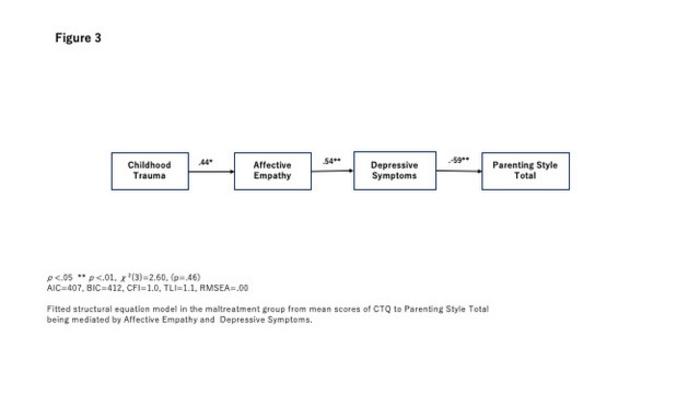Childhood maltreatment (CM) is a pervasive issue with complex implications that extend through generations, affecting not just individuals but entire family systems. Researchers have long recognized the insidious nature of childhood trauma, often manifesting itself as a cycle where parents who experienced abuse in their own childhoods may unintentionally perpetuate similar harm to their offspring. This cycle underscores the importance of understanding how psychological and emotional factors, particularly empathy, are influenced by a history of maltreatment, ultimately impacting parenting behaviors.
A recent groundbreaking study from the University of Fukui, Japan, has shed new light on this layered topic, offering insights into how childhood experiences of maltreatment shape maternal empathy and parenting styles. Conducted by Yuko Kawaguchi and her colleagues, this research employs path analysis—a sophisticated statistical technique—to explore the relationships among childhood maltreatment, emotional empathy, and parenting practices in mothers. The study, published in the journal Scientific Reports, emphasizes the critical role empathy plays in effective parenting and sheds light on potential intervention pathways that could ultimately disrupt the cycle of abuse.
Through their research, Kawaguchi and her team sought to explore the nuances of maternal maltreatment beyond a simplistic, binary understanding. By examining a range of mothers—those with histories of CM and those without—this study reveals the significant differences in emotional responsiveness, stress management, and parenting outcomes between these groups. Notably, the study’s findings highlight how individuals who endure abuse in their childhood may develop impaired empathy, further complicating their capacity to connect with their own children emotionally.
The implications of the study are profound. Children who endure CM often exhibit diminished empathic abilities, which can emerge as early as eight years old—an age where emotional development is critical. As these children grow into adulthood, their challenges in emotional expression and understanding can severely hinder their ability to nurture and emotionally support the next generation, thereby increasing the risk of childhood maltreatment.
In this context, the study’s use of path analysis allows for a multi-dimensional examination of various factors. The researchers contrasted the experiences of 13 mothers who had faced CM and engaged in maltreatment against a control group of 42 mothers who did not share these adverse experiences. By rigorously analyzing data from psychological assessments and physiological measures, the research identifies how childhood trauma influences not just parenting styles but also the emotional and psychological health of mothers.
Key tools used in this study included the Adverse Childhood Experiences (ACE) questionnaire, the Childhood Trauma Questionnaire (CTQ), and measures of empathy and depressive symptoms, such as the Interpersonal Reactivity Index (IRI) and the Self-Rating Depression Scale (SDS). This robust methodological approach lends credibility to the findings and underscores the interconnectedness of these variables in understanding the broader dynamics of parenting and emotional health.
The study’s results uncovered startling correlations: mothers who experienced childhood abuse scored significantly higher on trauma measures and reported greater emotional struggles, including heightened depressive symptoms. Importantly, the research indicates that lower levels of empathic engagement were linked to higher depressive symptomatology, suggesting that depression may exacerbate difficulties in emotional connectivity with children. This finding highlights the critical importance of addressing mental health issues in preventing intergenerational patterns of maltreatment.
Furthermore, the research indicates that CM does not merely affect emotional empathy in isolation; mothers who were themselves abused often struggle with recognizing and managing their children’s emotions, leading to overwhelming feelings that can precipitate maltreatment conditions. This creates a compounded risk factor that suggests the pressing need for interventions designed to address both emotional empathy and mental health concerns.
As Kawaguchi succinctly summarizes, the study highlights that a history of abuse can enhance emotional empathy, which plays a critical role in effective parenting. This nuanced understanding of the interrelation between past trauma and current maternal empathy paves the way for targeted interventions. Approaches that include mental health support for mothers who have experienced CM and parenting programs designed to cultivate emotional resilience and empathetic responsiveness may serve as effective strategies to break the cycle of maltreatment.
Looking ahead, this research has substantial implications for policy and practice in parenting education and mental health interventions. By integrating insights from the study into existing programs, stakeholders can foster healthier parent-child relationships and mitigate the risks associated with intergenerational trauma. Such efforts can lead to improved well-being for both parents and children, providing pathways for healing and resilience.
In conclusion, the findings from the University of Fukui present a compelling analysis of how childhood maltreatment impacts emotional empathy and parenting styles. As society grapples with the troubling phenomenon of intergenerational abuse, this research offers a promising direction for future studies and interventions aimed at fostering positive parental relationships while addressing the underlying emotional challenges faced by those with histories of trauma.
Understanding the profound interconnectedness of childhood experiences, emotional health, and parenting practices is essential in our efforts to disrupt cycles of abuse. The insights gained from this study illuminate the path forward in both academic research and practical support measures that can promote healthier family dynamics and empower future generations.
Subject of Research: People
Article Title: Effects of childhood maltreatment on mothers’ empathy and parenting styles in intergenerational transmission
News Publication Date: 5-Mar-2025
Web References: https://doi.org/10.1038/s41598-025-92804-0
References: AMED (20gk0110052, AT and SN), JSPS KAKENHI Scientific Research (A) (19H00617 and 22H00492, AT), (C) 22K02432 (SK and SN)
Image Credits: Yuko Kawaguchi et al. from University of Fukui, Japan
Keywords: Childhood maltreatment, empathy, maternal parenting, intergenerational transmission, trauma, emotional health, depressive symptoms, mental health interventions, parenting education, family dynamics.




